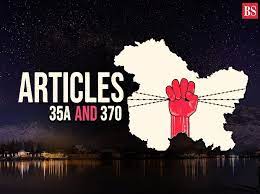B L Saraf
Ever since August the 5th, 2019 constitutional development which resulted in abrogation of Articles 370 and 35A an unprecedented phenomenon has been unfolding in J&K that has had the tendency to relegate its subjects to the margins . Jury is open, is it one of the collateral damages (if one can say so) or the unintended consequence of the development? In fact the game started in June 2018 when all of a sudden the PDP-BJP coalition Government was given a good bye and the state put under Governor’s rule. The arrangement continues till day.
One of the major after effects of these developments has been the relegation of the class 1 state -built by the Dogra rulers with their sweat and blood whose territory extended up to Tibet in North and Afghanistan in North West – to a mere Union Territory. Next, in the aftermath of 5th August constitutional changes the whole Valley was shut down and cut off from the outside world. Political activists and the leaders of any significance were confined to the place with all political activity coming to a grinding halt. Later on though some relaxation was given but J& K till now has no popular Government that would emanate from an elected Legislative Assembly. People have very little say in the matters of governance. Law enforcing agencies were let loose, mostly, on the persons deemed inconvenient to the powers that be in Delhi. Then bulldozer appeared on the scene to flatten the ‘ alleged manipulators’ turning, in the process, many places of the UT into rubble. To an independent observer it would mean that people residing JK have been generally living by the underhand means. It is, however, a known fact that many political big wigs of the time and resourceful men / women did garner valuable public property for personal leisure and pleasure. Therefore, it is no body’s case that the wrong doers should be let off. Let them face the might of law. But it can’t be in a way as to show that the UT is inhabited by the “crooks.” Certainly, there shouldn’t be the whole sale de legitimization of the people.
It goes against the grain of our constitution which puts “People” in a grand focus while prescribing a code of conduct to run the state business and govern the country. Chief Justice of India D Y Chanderchud has put it aptly when he, while addressing first convocation ceremony of the Maharashtra Law Institute University in Nagpur, characterized preamble of the “a short but weighty part of the constitution which stated that ” We the people of India give ourselves this Constitution.” He went on to say that the constitution marked the transition of people of India from the status of subjects to the status of citizens ……” So, the UT residents, like of other parts of the country, should be treated as citizens and not subjects .After all , J & K residents too are included in ” We The People ” mentioned in the Preamble of our Book of Governance .
The legitimacy of the system or the citizens is based entirely upon institutional practice and the trust state is able to produce. Once trust goes missing – as one unfortunately gets the impression that it is happening in the UT – people by and large stand disempowered and helpless. It isn’t good for the UT nor for the great and magnificent nation like India.
The impression must be dispelled and process of ignoring people should stop.The first thing that can be done in this regard is to have elections to constitute the legislative Assembly and give people a chance to have their own Government .The Supreme Court’s approval of the delimitation process may give an impetus to the election process Few days back, Home Minister Amit Shah told a news agency that he could say with satisfaction that terror incidents in Kashmir have reduced drastically after abrogation of Art 370. A record number of tourists are visiting the Valley. Well that gives solid a reason for holding Assembly elections without any further delay.
The powers that be in Delhi go on stressing the fact that in J&K democracy is visible and functional at the village level .Reference is made to the elected local bodies. That may be the case but elected local bodies is no substitute for the elected legislative Assembly. Here, we are reminded of Gen Ayub Khan’s “Basic Democracy” concept which he championed in Pakistan when he was at the helm, in 1960s. He touted the “Basic Democrats ” as true representatives of the people mandated to rule the country. But the hollowness of the concept and the structure didn’t allow it to stand and thus fell flat as fast as it had been erected. While not discounting their need these local bodies, because of their limited reach and lack of functional and financial autonomy, can’t be a substitute for an elected Assembly. Elected Assembly may empower people to a large extent and bring them back to the political and administrative reckoning.
Home Minister has expressed wish to have a new leadership in the UT which he feels will come up from the local bodies. And in the process, he prophesied, the old and traditional leadership in Kashmir will get dislodged. Does J&K need a new leadership and jettison the old one is a matter better left to the people to decide. Election to the Assembly is the only mode to test their preference. Wishes, howsoever pious, won’t count much.
In the Amrit Kaal let the people in J &K have a taste of Amrit of democracy and enjoy their Government, in new Avaatar or the old one.
(The author is Former Principal District & Sessions Judge)
Trending Now
E-Paper


